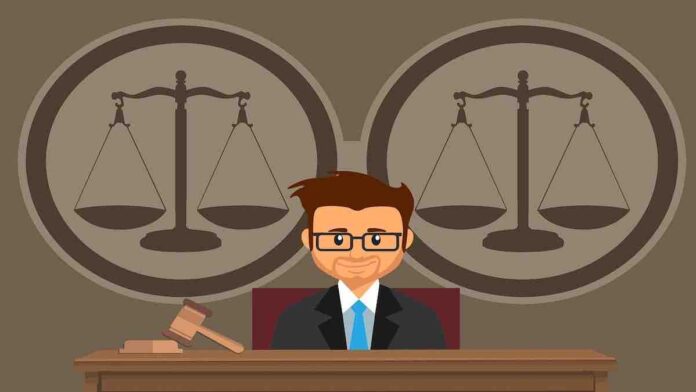Ever wondered that- Can a Judge be arrested if he is involved in any criminal acts?
The answer is Yes! India is a democratic nation and the Rule of Law exists in India. The legal sovereignty of India resides in the Constitution of India. Law is the sovereign power in India. Law is the absolute power and nobody is above law in India. Thus any person in India, irrespective of his designation can be arrested in India if he is involved in any illegal activity, but there are some checks.
Importance of Judiciary:
Judiciary is one of the most important pillars of democracy. It is an essential institution of the state which is responsible to make sure that Justice and equity prevail in society. Judges in the courts are the actual persons who actually have the power to decide what is Just.

Protection of Judges:
This power of the Judges comes with both great responsibilities and some privileges too. To make sure that there is no pressure on Judges while adjudicating on questions of justice, it is necessary to protect the Judges and Judicial Officers.
For the very same purpose, there is in existence the Judicial Officers Protection Act, 1850 which aims to protect Judges who are acting in good faith in the interest of Justice.
The Judges (Protection) Act, 1985 gives extra protection to Judges against criminal and civil cases.
Section 77 of the CrPC states that an act done by the judge in his judicial capacity and good faith will not be considered as an offense.
Section 228 and 345 of the CrPC provides that no person can insult a Judge or obstruct the Court Proceedings.
Also Read
Responsibilities of Judges:
Thus it is evident that Judges have been given enough protection. Vast power has been vested in the hands of Judges.
However, the same power cannot be misused by Judges. If a Judge misuses his power or if he is involved in any illegal activity, then he can be arrested just like any other offender of the law.
But the Judge cannot be arrested just like any other person.
Judges are part of a prestigious institution and they should be handled with proper care and attention while being arrested.
In the landmark case of Delhi judicial services association v. the State of Gujarat, the Supreme Court has laid down guidelines to arrest a Judge. The guidelines are:
- Where a judicial officer is to be arrested, the District Judge or the High Court should be intimated.
- However, where immediate arrest of a judicial officer is required, the same can be done, after recording reasons, but the fact of such arrest should be immediately communicated to the concerned District Judge and Chief Justice of the High Court.
- To take the arrested judicial officer to police station prior permission of the District & Sessions Judge of the concerned district shall be required.
- Communication facilities to talk with family, Lawyer, and Judicial Officers (District and Session Judge) should be provided immediately to the arrested judicial officer.
- Panchnama, Recording of Statement, and Medical Test shall be done only in the presence of the Lawyer or any Judicial Officer of higher rank.
- The Judicial Officer should not be handcuffed. However, in a case where there is an imminent need to effect the physical arrest to avert danger to life and limb, such a person can be overpowered and handcuffed.
- In case of necessity of handcuff, the District & Sessions Judge and the Chief Justice of the High Court should be immediately informed. Such a burden falls on the Police to establish the necessity for handcuffing. If found that such handcuffing was unjustified, such Police Officers responsible for it would be guilty of misconduct and would be personally liable for the compensation or damages as determined by the High Court.
The Judges (Inquiry) Act, 1968 deals with the misbehavior of Judges of the Supreme Court and High Court. It gives the procedure to investigate the matters against Judges of the Supreme Court and the High Court.
Other Landmark Cases:
In a recent case, a Judge from Pune was arrested by the Anti Corruption Bureau(ACB) for taking bribes to give judgment in favour of a party. Click here to read Law Trend’s full article on that case.
In the case of Daya Shankar v. High Court of Allahabad, Daya Shankar, a member of the UP State Judicial Services, was pursuing LLM degree. He was found cheating in one of the exams of LLM. The Allahabad HC held that protection to the member of State Judicial Services cannot be given if he is involved in illegal activities.
In the case of State of U.P. v. Tulsi Ram, a JMFC Judge issued a non-bailable warrant against an accused despite the fact that the accused was acquitted by the High Court. The accused appealed against the non-bailable warrant issued by the JMFC and it was held by the HC that the action of JMFC was negligent and it could not be protected under the Judicial Officers Protection Act, 1850. The court held that the JMFC Judge could be held liable for his negligent act and he could also be made to pay damages for the same.
Conclusion:
Judiciary is an important part of the democracy and the Judicial Officers play a pivotal role in maintaining the Supreme Rule of Law. Many provisions exist to protect Judicial Officers from offences but at the same time, the different courts have remarked multiple times that the protection of Judicial Officers is not unreasonable. If found guilty, then even the Judicial Officers can be arrested and punished. After all, nobody is above the Law!
Edited By-
Rajat Rajan Singh
Editor-In-Chief at Law Trend
Advocate at Allahabad High Court Lucknow
Written by
Harshwardhan Pawar-Intern







